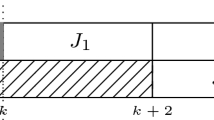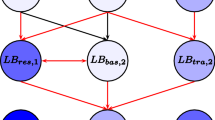Abstract
In this paper we deal with variants of traditional cases of unavailability constraints in scheduling problems. In the literature, two main approaches are usually found. In the first one, operations can be interrupted by unavailability periods and in the second one, operations cannot be interrupted. The context we consider is more general; some operations can be interrupted, the others cannot. Moreover, we assume that information can be related to operations as well as to unavailability periods. Consequently an unavailability period can make possible or not the interruption of an operation. As an application to this new problem, the single machine problem with heads and tails and the job-shop scheduling problem are tackled. All combinations of possible cases are studied and after a review of the state-of-the-art, branch-and-bound algorithms are proposed to solve these problems. Finally, computational experiments are conducted and discussed.
Similar content being viewed by others
References
Adams, J., E. Balas, and D. Zawack, “The shifting bottleneck procedure for job shop scheduling,” Management Science, 34(3):391–401, 1988.
R. Aggoune. Ordonnancement d’ateliers sous contraintes de disponibilite des machines (in french). Phd thesis, Universite de Metz, Metz, France, december 2002.
K. R. Baker and Z. S. Su. Sequencing with due-dates and early start times to minimize maximum tardiness. Naval Res. Logist. Quart., 21:171–176, 1974.
E. Balas, G. Lancia, P. Serafhi, and A. Vazacopoulos. Job shop scheduling with deadlines. Journal of Combinatorial Optimization, 1(4):329–353, 1998.
J. Blazewicz, J. Breit, P. Formanowicz, W. Kubiak, and G. Schmidt. Heuristic algorithms for the two-machines fbwshop with limited machine availability. Omega, 29(6):599–608, 2001.
W. Brinkkotter and P. Brucker. Solving open benchmark instances for the job shop problem by parallel head-tail adjustments. Journal of Scheduling, 4:53–64, 2001.
P. Brucker, B. Jusrish, and B. Sievers. A fast branch and bound algorihtm for the job-shop scheduling problem. Discrete Applied Mathematics, 49:107–127, 1994.
C. Canon, J-C. Billaut, and J-L. Bouquard. The one-machine sequencing problem with availability constraints. Technical Report 271, Laboratoire d’Informatique de FUniversite de Tours, Tours, France, August 2003.
J. Carlier. The one-machine sequencing problem. European Journal of Operational Research, 11:42–47, 1982.
J. Carlier and E. Pinson. An algorithm for solving the job-shop problem. Management Science, 35(2):164–176, 1989.
J. Carlier and E. Pinson. A practical use of Jackson’s preemptive schedule for solving the job-shop problem. Annals of Operations Research, 26:269–287, 1990.
J. Carlier and E. Pinson. Adjustment of heads and tails for the job-shop problem. European Journal of Operational Research, 78:146–161, 1994.
H. Fischer and L. Thompson. Probabilistic learning Combinations of local job-shop scheduling rules. Prentice Hall, Englewood Cliffs, New Jersey, 1963.
M. R. Carey and D. S. Johnson. Computers and Intractability : A Guide to the Theory of NP-Completness. W.H. Freeman and Co, San Francisco, California, 1979.
M. R. Carey, D. S. Johnson, and R. Sethi. The complexity of fbwshop and jobshop scheduling. Mathematics of Operations Research, 13:330–348, 1976.
J. Grabowski, E. Nowicki, and S. Zdrzalka. A block approach for single-machine scheduling with release dates and due dates. European Journal of Operational Research, 26:278–285, 1986.
R. L. Graham, E. L. Lawler, and J. K. Lenstra A. H. G. Rinnooy Kan. Optimization and approximation in deterministic sequencing and scheduling : A survey. Annals of Discrete Mathematics, 4:287–326, 1979.
J. R. Jackson. Scheduling a production line to minimize maximum tardiness, research report 43, management science research report. University of California, Los Angeles, 1955.Technical report,
B. J. Lageweg, J. K. Lenstra, and A. H. G. Rinnooy Kan. Minimizing maximum lateness on one machine : Computational experience and some applications. Statistica Neerlandica, 30:25–41, 1976.
B. J. Lageweg, J. K. Lenstra, and A. H. G. Rinnooy Kan. Job-shop scheduling by implicit enumeration. Management Science, 24(4):441–450, 1977.
S. Lawrence. Resource constrained project scheduling: an experimental investigation of heuristic scheduling techniques (supplement). Technical Report (http://mscmga.ms.ic.ac.uk/info.html), Graduate School of Industrial Administration, Carnegie-Mellon University, Pittsburgh, Pennsylvania, 1984.
J. K. Lenstra, A. H. G. Rinnooy Kan, and P. Brucker. Complexity of machine scheduling problems. Annals of Discrete Mathematics, 1:343–362, 1977.
V. J. Leon and S. D. Wu. On scheduling with ready-times, due-dates and vacations. Naval Research Logistics, 39:53–65, 1992.
P. Martin and D. B. Shrnoys. A new approach to computing optimal schedules for the job-shop sheduling problem. In 5th International Conference on Integer Programming and Combinatorial Optimization (IPCO’96), pages 389–403, Vancouver (Canada), 1996.
P. Mauguiere, J-C. Billaut, and J-L. Bouquard. Scheduling resumable and non-resumable operations. In Proceedings of the Joint International Meeting EURO/INFORMS, pages 147–148, Istanbul (Turkey), July, 2003.
P. Mauguiere, J-L. Bouquard, and J-C. Billaut. A branch and bound algorithm for a job shop scheduling problem with availability constraints. In Proceedings of the Sixth Workshop on Models and Algorithms for Planning and Scheduling Problems, MAPSP’2003, pages 147–148, Aussois (France), April, 2003.
G. McMahon and M. Florian. On scheduling with ready times and due dates to minimize maximum lateness. Operations Research, 23(3):475–482, 1975.
L. Peridy and D. Rivreau. Local adjustments: A general algorithm. European Journal of Operational Research, to appear, 2004.
B. Roy and B. Sussmann. Les problemes d’ordonnancement avec contraintes disjonctives (in French). Technical Report 9 bis, SEMA, Paris (France), December 1964.
L. Schrage. Obtaining optimal solutions to resource constrained network scheduling problems (unpublished manuscript), 1971.
F. Sourd and W. Nuijten. Multiple-machine lower bounds for shop scheduling problems. INFORMS Journal of Computing, 12(4):341–352, 2000.
A. Vazacopoulos. Difficult one-machine scheduling problems and a new longest tail heuristic. Phd thesis (chapter 5), 1994.
Author information
Authors and Affiliations
Corresponding author
Rights and permissions
About this article
Cite this article
Mauguière, P., Billaut, JC. & Bouquard, JL. New Single Machine and Job-Shop Scheduling Problems with Availability Constraints. J Sched 8, 211–231 (2005). https://doi.org/10.1007/s10951-005-6812-2
Issue Date:
DOI: https://doi.org/10.1007/s10951-005-6812-2




